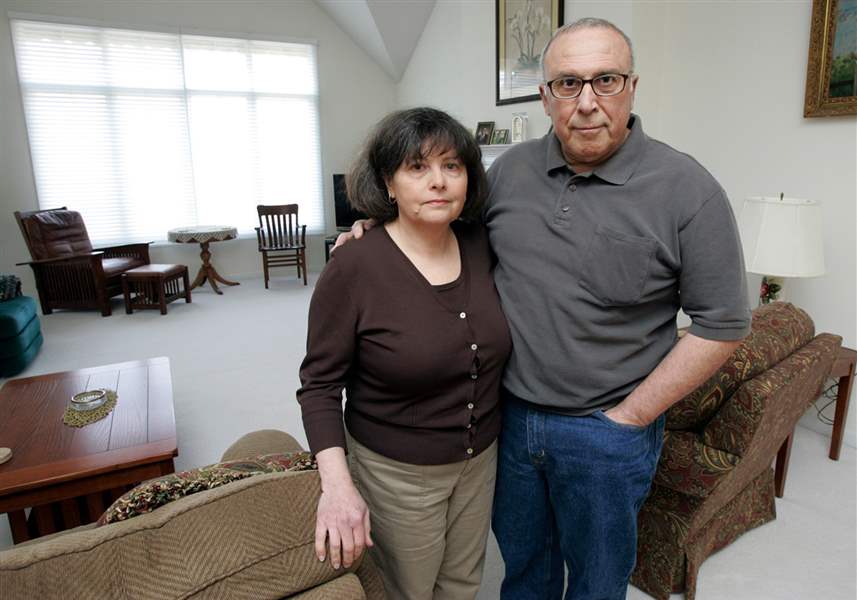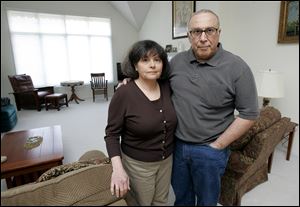
FAMILIES COPING
Grateful couple striving to aid those less fortunate
'It's necessary for us to give back'
3/30/2009
Rose and Al Geha, in their Waterville home, retired in 2007.
The Blade/Dave Zapotosky
Buy This Image

Rose and Al Geha, in their Waterville home, retired in 2007. Today, they volunteer with Mobile Meals and contribute to a weekly food collection. Mr. Geha offers tax preparation services.
The Blade and WTOL-TV Channel 11 are teaming up throughout the year to tell the stories of how several families are coping with hard times.
A lifetime of saving, investing, and thinking twice before spending has left retirees Al and Rose Geha sitting financially pretty in an upscale Waterville neighborhood.
But they're not sitting idle in those plush chairs, somewhere off on the sidelines of the recession that has crushed so many people. They're trying to help those who aren't as comfortable as they are.
And they're smart enough to know that one's fortunes can change in a flash.
"We're optimistic people," said Mrs. Geha, 61, who was born in Cairo. Yet, "it could happen to us. You never know. It worries me."
POVERTY LINE: Unraveling the safety net
No one is left untouched by the economic downturn, it seems, whether the effect is measured in real pain or simply a sense of uneasiness. Even the financially secure are looking over their shoulders.
"We've never been busier analyzing portfolios and talking about risk-management techniques," said Toledo financial planner Alan Lancz, president of Alan B. Lancz & Associates Inc.
The firm, which traditionally has limited its business to clients with a net worth of at least a million dollars, decided about eight months ago to lower the minimum because so many upper-middle-class investors were desperate for help.
These new clients are looking at their investments and trying to understand them, he said. "I think a lot of people had investments that they didn't know the risks they were taking."
Some have said that because of their stock market losses, they're delaying retirement, selling a second home, refinancing, consolidating debt, and economizing with whatever discretionary income they have.

The Gehas, who both retired on her birthday in October, 2007, also are cutting back on expenses, although they've always been financially conservative. "We pay cash for everything. We never put anything on credit," Mr. Geha, 65, said.
They have no debt - even the house they built eight years ago is theirs, free and clear.
"We pay as we go. If we didn't have it, we didn't get it," Mrs. Geha said.
The couple met in Cairo at Christmastime in 1968. Mr. Geha was in the service, stationed in Saudi Arabia, and while on leave he traveled to Egypt to visit Rose's parents, who were friends of his parents. Four days after leaving Cairo, he returned to ask her father for permission to marry his daughter.
They wed in April, 1969, and came back to the United States after Mr. Geha finished his tour of duty three months later.
Mr. Geha went to school on the GI Bill, earning bachelor's, master's, and educational specialist degrees from the University of Toledo. He worked first at Washington Local Schools and later at the former Medical College of Ohio. Mrs. Geha, who graduated with an associate's degree from UT, also worked at the former MCO.
Over the years, they faithfully put money away in retirement accounts. Today, their investments have dropped sharply in value because of the market plunge, but they hope to put off tapping those for several years. In the meantime, they live on their pensions through the Ohio Public Employee Retirement System. Mr. Geha gets a little Society Security as well.
They weren't always financially comfortable. Mrs. Geha, the daughter of a goldsmith, said her family lived a simple, no-frills existence; Mr. Geha said that his father "had nothing." By saving and spending wisely, the couple hoped to spare themselves a life of poverty and to be able to leave something for their children.
They have a daughter and a son, two grandchildren, and a third due in May.
"We really made the American dream here," said Mr. Geha, who was born in Lebanon and came to the United States through Ellis Island as a child in 1946. His father, a U.S. citizen, brought the family to Toledo and opened a grocery store.
When his father died, the destitute family got help through the International Institute and a local "red feather" charitable organization. "That's one of the reasons I feel it's necessary for us to give back to the community. We're fortunate enough to have done well," he said.
They deliver food to shut-ins about three times a month as volunteers for Mobile Meals, and purchase food weekly for a collection at Historic St. Patrick Church. Mr. Geha also volunteers for the United Way by preparing tax returns at no charge.
"We're concerned about what we see," Mr. Geha said, noting it's not just the indigent, but people like his suburban neighbors who are being hurt by the recession.
"It hasn't made a big, drastic change in our lives," he said. They've pulled back some, "but I can't say we're hurting because of the economy."
"For now," his wife added.
Contact Ann Weber at:
aweber@theblade.com
or 419-724-6126.